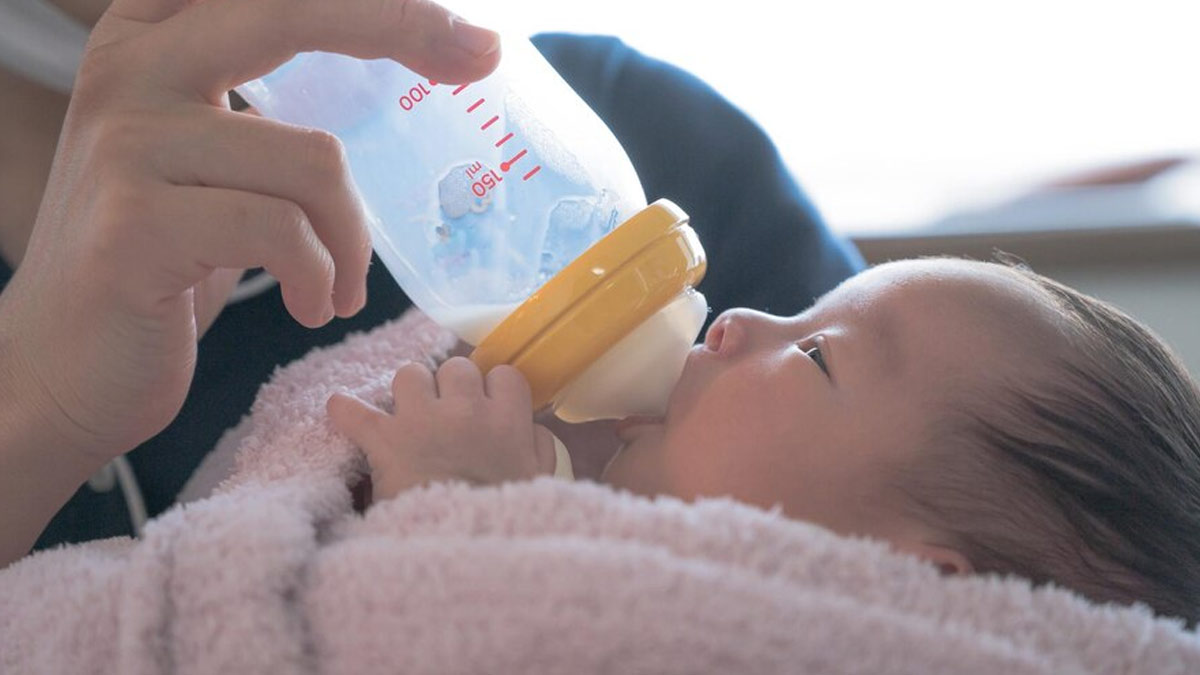
Does your child sleep with the bottle filled with milk in their mouth? It's time you avoid this prolonged exposure to sugary liquids while sleeping or napping as it can lead to a condition known as nursing bottle caries. It is commonly referred to as baby bottle tooth decay or early childhood caries and is characterised by severe decay in the primary teeth of infants or toddlers. We spoke to our expert Lt Gen Dr Vimal Arora, Chief Clinical Officer, Clove Dental, who explained this condition, its symptoms, and treatment measures.

Nursing bottle caries primarily occur due to prolonged exposure of the teeth to sugary liquids, such as milk, juice, or sweetened beverages, often facilitated through prolonged use of nursing bottles or sippy cups. “This condition represents a concerning trend in paediatric dental health. Its impact goes beyond immediate dental issues, potentially affecting a child's overall health and development”, highlighted Lt Gen Dr Arora.
Causes Of Nursing Bottle Caries
According to research conducted by the Conversation, certain formula milk has twice as much sugar per serving as compared to a glass of soda. The sugar content in milk solutions of famous infant milk formula brands ranges from approximately 7g/100mL to higher concentrations if mixed with certain sweeteners. Babies typically consume milk multiple times daily, with an average daily intake of around 600-800 mL.
Lt Gen Dr Arora informed, “Considering an average sugar content of 7g/100mL (which might be higher depending on the specific milk formula), the daily sugar intake through milk for a baby in India could range from 42-56 grams if consuming 600-800 mL daily.”
The concern arises as frequent exposure to sugar, even from milk, can contribute to tooth decay in infants. When babies fall asleep with bottles containing sugary liquids, the sugar stays in their mouth, providing a breeding ground for cariogenic bacteria, including Streptococcus mutans, Lactobacilli, etc.
Also Read: Why Is Ice Cream Helpful Post Tooth Extraction, Expert Explains
Symptoms of Nursing Bottle Caries

Lt Gen Dr Arora listed some of the symptoms of nursing bottle caries as follows:
- White spots or discolouration on the teeth, particularly around the gum line.
- As the condition progresses, it may lead to brown or black areas on the teeth.
- Children might experience pain or sensitivity when eating or drinking, particularly with hot, cold, or sweet foods and beverages.
- Pain or discomfort while chewing can lead to reluctance or refusal to eat.
- In severe cases, swelling or abscesses in the gums might occur, leading to pain and discomfort.
If left untreated, nursing bottle caries can affect permanent teeth' proper development and alignment.
Also Read: Healthy Teeth, Healthy Smile: Home Remedies To Get Rid Of Tartar From Teeth
Treatment Options For Nursing Bottle Caries
Here are some treatment options listed by Lt Gen Dr Arora for the treatment of nursing bottle caries:

Promoting Good Oral Hygiene
- Wipe the baby's gums after feeding to maintain cleanliness.
- Emphasise the importance of regular oral hygiene practices.
Avoiding Sugary Drinks
Discourage the use of sugary drinks in bottles, as they contribute to nursing bottle caries.
Scheduling Dental Check-ups
Regular dental check-ups are crucial for monitoring oral health and addressing any emerging issues promptly.
Limiting Prolonged Exposure
Minimise the duration of exposure to sugary liquids, reducing the risk of nursing bottle caries.
Encouraging Transition to Cup
Advocate for transitioning from the bottle to a cup at an early age, promoting healthier oral habits in infants and toddlers.
Message From The Expert
Lt Gen Dr Vimal Arora concluded, “Optimal oral health for infants involves the consumption of unsweetened milk from a bottle when the baby is awake. However, allowing a baby to drink sweetened milk while asleep poses a significant risk of developing nursing bottle caries.”
He added, “Sweetened milk, particularly when retained in the oral cavity during sleep, fosters an environment conducive to the proliferation of cariogenic bacteria. This bacterial presence accelerates the onset of dental caries, emphasising the importance of avoiding sweetened liquids during sleep. Also, maintaining stringent sterilisation of the bottle nipple is crucial to minimise the introduction of harmful bacteria, further safeguarding the infant's oral health.”
[Disclaimer: This article contains information provided by a registered healthcare professional and is for informational purposes only. We advise you to not substitute this information with medical treatment and to consult your doctor for necessary measures.]







